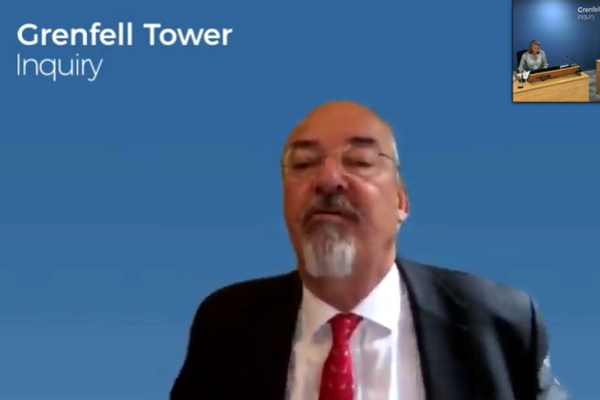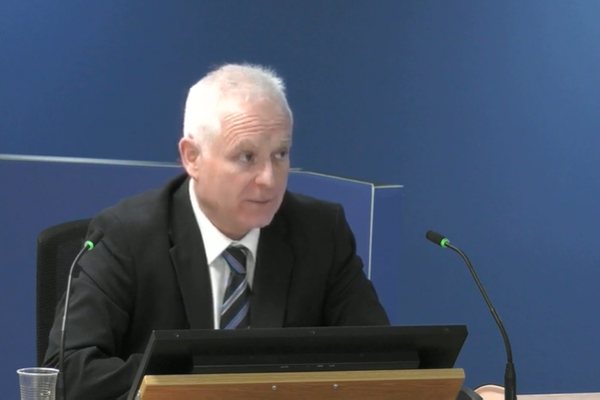LFB only logged 4% of incidents on improvement database amid fear system was ‘punitive’, inquiry hears
London Fire Brigade (LFB) teams logged only 4% of the incidents they attended on a database used for learning from mistakes, amid fears from firefighters that the reports were considered “punitive”, the Grenfell Tower Inquiry heard today.
Rita Dexter, a former deputy commissioner at the LFB, was grilled about her role in the years before the fire and in particular her time chairing the brigade’s Operational Directorates Co-ordination Board (ODCB).
The ODCB was a senior committee set up to review the LFB’s performance, and announce new training packages through newsletters circulated to fire stations as a result.
A key source of data for this work was a database of reports, which were filled in by crews in the aftermath of an incident. Ms Dexter described these reports as a “post-mortem” which recorded “a range of observations both good and bad”.
But a report from September 2014 showed that of 47,105 incidents attended by the LFB, reports were filed for just 1,679 – meaning 96% had not been recorded.
There was not an obligation to report all incidents but instead for “exceptions”, where for example the performance of an individual or a piece of equipment fell below the required standard.
Ms Dexter said the 47,000 headline number of incidents risked creating “the wrong impression” because “overwhelmingly incidents attended result in not very much action”.
“This will include incidents where [fire engines] arrived and immediately returned, for example, because the incident was over, but it’s still an incident in fire brigade recording terms,” she said.
However, she added that take-up of the system “certainly was poor initially” and while it got better was “not to the level we would want”.
She said staff were apparently afraid a record of their mistakes would be seen as punitive, and firefighters feared they would “get in trouble if they reported fault or failure”. Ms Dexter said this was the “common understanding of why take-up was low” within the LFB.
Comments about individual firefighters recorded on the database were emailed to their seniors and automatically included on their personal development plan.
She said the board had tried to resolve this through reports in the station newsletter, Operation News. “We did our best to reflect back that it was genuinely intended to be an improvement tool. But clearly, there was still some reluctance to engage with it,” she said.
“Do you agree that such a limited take-up of the [database], where it wasn’t mandatory, was a significant limitation on its efficacy as a reporting tool?” asked Richard Millett QC, lead counsel to the inquiry.
Ms Dexter said the 4% figure was “creating a deceiving picture” and the job of the tool was “capturing the most important information”.
“Did nobody at ODCB level ever look at these statistics and ask the question, whether 4% is good and representative, or bad and unrepresentative?” Mr Millett asked.
“I guess that could have been done, Mr Millett,” she replied. “I don’t think I ever asked anybody to do it, but my suspicion is it would have been a quick dead end.”
Ms Dexter, who joined the brigade in 2001 following senior roles in local government and became the first non-operational staff member to be promoted to the role of deputy commissioner, was also asked several questions about the confusing structure of the LFB’s many committees, sub-committees and acronyms.
“People watching might wonder why the LFB got itself into a position where it had a sort of juggernaut-like grand structure of nomenclature and initials, which is quite difficult to penetrate from the outside,” said Mr Millett.
“My question is: did it ever occur to you that the structure within which you were working was clunky and difficult to manage, where lines of communication didn’t work very well and you got enmeshed in it all?”
“No,” she replied. “London Fire Brigade is a complicated organisation, often necessarily so, possibly sometimes unnecessarily so. But many people in London Fire Brigade are doing difficult, intricate things... If I came across things that were ridiculously complicated I would have changed them.”
The inquiry also saw a “peer report” today from 2015, prepared by the Chief Fire Officers Association and the Local Government Association, which described the training offered by the LFB as “sheep dip”.
The inquiry heard yesterday that new training packages requested by the coroner investigating the fatal 2009 high-rise fire in Lakanal House, south London, were still being piloted and scoped out at the time of the Grenfell Tower blaze.
This follows its conclusion in its first phase that training did not adequately prepare the incident commanders who took control of the Grenfell fire for an incident of that magnitude.
In her witness statement, Ms Dexter said it “was hard to make some lessons learned” and some issues “repeatedly presented themselves back to us”. She listed “messages from incidents” as one of these.
“Did nobody ever think that there was something about the LFB as an institution that was peculiarly resistant to change, which would have meant that these hurdles could be overcome?” asked Mr Millett.
“I don’t want to convey to you either that we were complacent about it, or that we were cocky about it. I don’t think we were either of those two things. I think we were trying really hard to do the best we could,” replied Ms Dexter.
Earlier, Ms Dexter referenced a “terribly difficult period” in the organisation’s relationship with then-London mayor Boris Johnson as he sought to make cuts to the fire service in the early 2010s.
“It was a terribly difficult period in terms of the relationship with the mayor," she said. “Particularly where the proposals around, for example, station closures were being discussed.”
Ms Dexter left the LFB after being made redundant in 2015.
This morning, the inquiry heard the end of evidence from Peter Groves, former head of training at the LFB, who was asked about training relating to difficulties with communication devices – such as radios – during major incidents.
This followed serious problems using them at the Lakanal House fire, with the volume of messages making it difficult to get clear information to and from firefighters in the building.
Similarly serious problems were experienced at Grenfell Tower – with the brigade resorting to running messages in and out of the tower on scraps of paper.
Shown slides from the training sessions, Mr Groves agreed that they did not “instruct crews about the difficulties that may be encountered when fighting fires and in high-rise buildings” and as a result did not “meet or address the communications issues that were experienced at Lakanal”.
The inquiry continues, with further evidence from Ms Dexter tomorrow.
Sign up for our weekly Grenfell Inquiry newsletter
Each week we send out a newsletter rounding up the key news from the Grenfell Inquiry, along with the headlines from the week
Already have an account? Click here to manage your newsletters


